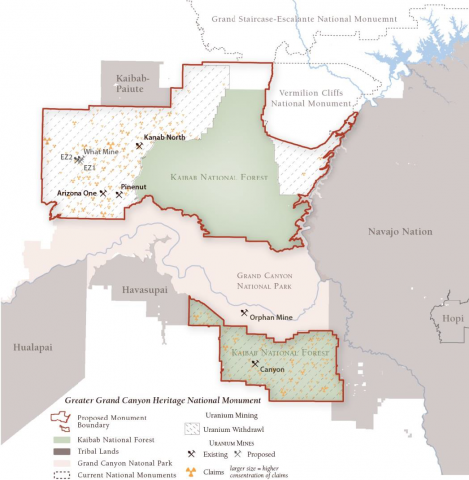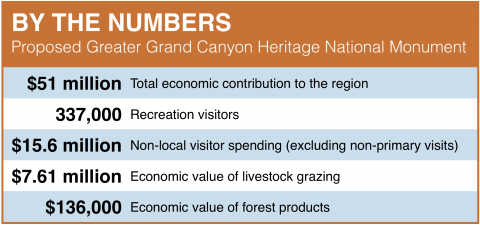

DENVER—A new economic analysis from BBC Research & Consulting on behalf of the Center for Western Priorities finds the proposed Greater Grand Canyon Heritage National Monument area in northern Arizona provides $51 million in economic benefits each year.
The $51 million includes spending by out-of-town visitors to the proposed monument area, along with revenues from land management operations, grazing, mining, and forest products. Visitors spend millions on lodging, restaurants, and outdoor recreation; these dollars recirculate throughout the region, providing a broad economic benefit. But failure to permanently protect the region could place the $51 million annual contribution to local economies at risk.
“This research shows the proposed Greater Grand Canyon Heritage National Monument is a major economic force in the region and would be preserved or even enhanced with a formal monument designation,” said Mollie Fitzpatrick of BBC Research & Consulting. “The typical visitor to the area spends hundreds of dollars a day, and with hundreds of thousands of visitors each year, it adds up to a huge impact.”
The proposed monument, as described in the Greater Grand Canyon Heritage Monument Act introduced earlier this month by Arizona Rep. Raul Grijvala, would encompass 1.7 million acres of public land. It would connect two existing national monuments across the northern border of Grand Canyon National Park plus part of the Kaibab National Forest along the southern border of the park.
The study is a snapshot of the existing economic benefits of the region around the proposed monument. It isolates the economic benefits generated by “primary visitors” into the region—those who travel specifically to visit the proposed Greater Grand Canyon Heritage National Monument. This means that the economic benefits from recreation are from the proposed monument area alone, and separate from the visitors who travel to Grand Canyon National Park and may make a side trip into the greater Grand Canyon area.
Grand Canyon Trust
While the study did not attempt to quantify the effects a monument designation would have on future economic activity in the area, previous monument designations have shown significant economic benefits by raising the profile of the area among potential visitors.
The Center for Western Priorities released this analysis as part of its ongoing efforts to understand and document the economic effects of land conservation and protection across the West. In February 2015, CWP and BBC studied the economic impact of the Upper Missouri River Breaks National Monument in Montana.
“Study after study shows that protected public lands are good for local economies,” said Greg Zimmerman, policy director at the Center for Western Priorities. “Not only do protected lands provide jobs and economic output, they are a recruitment tool for businesses in attracting talented employees who want to live close to outdoor recreation opportunities. And they also preserve qualities that cannot be monetized as easily, like cultural resources, local character, and access.”
Dozens of local groups and organizations have called on Congress or President Barack Obama to designate the Greater Grand Canyon Heritage National Monument, including five nearby tribes, outdoor recreation leaders, and local businesses.
Danny Giovale, the owner of Flagstaff-based Kahtoola added, “The outdoor lifestyle in northern Arizona is one of the biggest reasons our associates love working here. Tourists already flock to national parks in the region, and designating a new national monument adds an incentive for those visitors to stop and explore, rather than just drive through on their way to the next park. This report shows why protecting the lands around Grand Canyon isn’t just good for the environment—it’s also good business.”
The authors of the BBC Research & Consulting study are available for video and audio interviews. The full report is available at westernpriorities.org/grandcanyon. To speak with an expert about economic activity in the proposed Greater Grand Canyon Heritage National Monument, contact CWP media director Aaron Weiss at 720-279-0019 or aaron@westernpriorities.org.